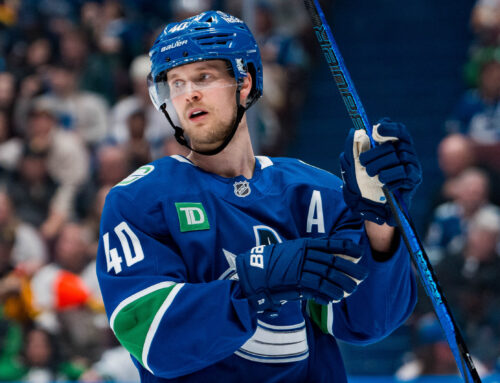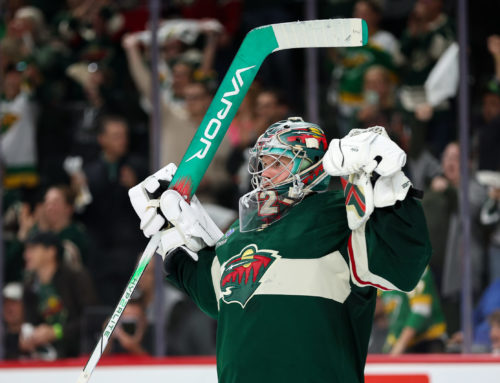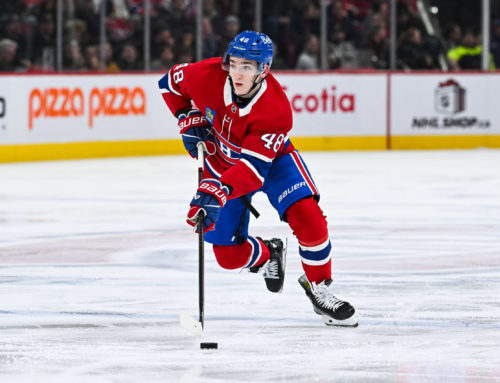
Sometimes, low-scoring games can be a lot of fun to watch, even in the regular season. Despite some expectation of goals in the Edmonton-Washington game Sunday night, it was more of a defensive battle. It was also not a fun low-scoring game.
The first forty minutes saw very little in the way of dangerous chances. Braden Holtby had basically nothing to do until the final minute of the second period when he made a couple of impressive saves on Patrick Maroon. Washington didn’t generate much in return.
Jujhar Khaira scored his first goal of the year early in the third period followed by a game-tying goal from Dmitry Orlov a few minutes later. That score would hold up heading into the shootout.
TJ Sochi scored the lone shootout goal to give the Caps their 10th win of the year, and they’ve now won five of six in November. That was also the 10th win for Holtby this year, who stopped 29 of 30 to backstop his team. Laurent Brossoit got the start but didn’t face much rubber, saving 18 of 19 shots.
Orlov had a very fine fantasy night, adding three shots, a blocked shot, and a hit to his goal. Nicklas Backstrom and Evgeny Kuznetsov combined to play nearly 45 of the 65 minutes available.
Maroon had seven shots on goal in this one (I think four came in the final minute of the second frame), and added a healthy seven penalty minutes which included a spirited fight with Tom Wilson. Darnell Nurse had three shots, four blocks, and three hits for a solid peripheral night. He also was given about three more minutes of ice time than Oscar Klefbom.
*
At the other end of the spectrum, the Devils-Blackhawks game was absolutely bonkers.
We were off to the races 40 seconds in as Artem Anisimov scored his sixth of the year. Oh yeah, Joel Quenneville reunited Anisimov and Patrick Kane, so the lineup carousel continues (not that it’s a surprise to anyone). Miles Wood scored about three minutes later, and then Chicago reeled off three goals in four minutes from Alex DeBrincat, Jan Rutta, and Tanner Kero. Wood answered before the period was out, giving us a 4-2 Chicago lead after 20.
The fun was just starting.
New Jersey potted four straight goals of their own in the second period from Andy Greene, Nico Hischier, Taylor Hall, and Brian Gibbons. Gibbons, by the way, has eight goals this year and leads all Devils in that category. Sure. Why not.
Kane added a late second period PP goal to make it 6-5.
Wood completed the hatty early in the third period and it would finish as a 7-5 Devils win.
Wood added an assist to his three goals, Hischier added two assists to his goal, while Hall and Greene had one of each. Damon Severson had a solid pointless effort with a plus-2, two shots, five blocks, two penalty minutes, and two hits. Steven Santini had 10 blocked shots; he had 18 in 14 games going into Sunday.
Rutta had a goal and two assists while Kane had one and one. Schmaltz managed two assists with a shot.
Keith Kinkaid stopped 39 of 44 in the win. Corey Crawford was pulled after the second period allowing six goals on 25 shots. Given how good he’s been for the team this year, he was kind of due for one of these games.
*
The dinged-up Ducks kept the game close on the scoreboard against Tampa Bay but the Lightning were in control pretty much from start to finish.
Everyone’s favourite top line* opened the scoring with a power-play goal in the second period as Vladislav Namestnikov scored his ninth from Steven Stamkos and Nikita Kucherov. Jakob Silverberg tallied his fifth of the year early in the third to tie the game but was replied by JT Brown four minutes later. Brown’s goal would hold up as the winner.
(*level of favour for the top line is dependent on how many of them you have on your fantasy rosters)
Andrei Vasilevskiy, particularly in the third period where he saved all 14 shots, was sharp in this one. He stopped 28 of 29 overall for the win. His save percentage on the season is now up to an even .930 with 13 wins to go along with it.
John Gibson was very good in allowing just two goals on 37 shots but came up a bit short.
With six shots on goal, Silfverberg is up to an even 60 in 17 games this year, or 3.53 per game. His career-high is 2.87 which was set last year.
The Namestamkucherov line had 14 shots on goal between the three of them while Anaheim as a team had 14 through 40 minutes.
*
San Jose debuted some new lines in this game, essentially bumping Joe Thornton down to the second line:
Major line changes tonight in warmups. Couture between Pavelski and Hertl. Thornton with Donskoi and Karlsson. Tierney between Labanc and Boedker.
— Kevin Kurz (@KKurzNHL) November 13, 2017
There have been uncorroborated musings that maybe Thornton isn’t fully recovered from his offseason knee surgery so maybe they’re just going to slow his minutes down and give him easier matchups. He did play just 14 minutes on Saturday night as it was.
Anyway, this game played out pretty similarly to the Caps/Oilers game – it was a mostly-boring and low-scoring tilt. Dustin Brown got the Kings on the board first with his eighth goal. For the record, his eighth goal last year came in the second week of February (same as the year before that, too). That held until five minutes into the third when Melker Karlsson tied things up. Joel Ward scored just shy of the seven-minute mark on a redirection with his skate, and that held up as the game-winning goal.
Brent Burns had five more shots on goal without scoring, now up to 65 on the year. He had four goals on his first 63 shots last year. C'est la vie.
Anze Kopitar and Drew Doughty assisted on Brown's goal, giving them 21 and 11 points, respectively.
Martin Jones earned his eighth win in 12 starts this year and saved 26 in the 2-1 victory.
****
Teams have played anywhere from 15-19 games which means we’re about 20 percent of the way through the regular season. Time flies when you’re tormenting yourself over draft picks, but it’s not too early to start looking at trends developing for certain players.
I want to focus on a trio of Eastern Conference forwards that were probably taken in the top-50 picks of just about every draft this year: Max Pacioretty, Jack Eichel, and Artemi Panarin. The common thread? None of them have a regulation power-play goal this year (Pacioretty scored an overtime PP goal earlier this month against Winnipeg). With only four games on the slate last night, I thought I would dig into why this is happening beyond just randomness.
Pacioretty
For the second year in a row, Montreal’s captain had a slow goal-scoring start to the year, then he went on a tear, and then everyone’s like, “oh yeah, he’s going to score 30 again.” Lather, rinse, repeat.
The scary part, I suppose, is that he has just one power-play goal on the campaign and he’s averaged 8.25 over the previous four years. So, what’s going on?
To start, it’s not a lack of shooting. He’s managing 42.16 shot attempts per 60 minutes while on the power play. That’s second in the NHL among forwards with at least 50 power-play minutes (Alex Ovechkin is first), and way, way ahead of where he was over those previous four seasons mentioned (23.43). Over those four years, he shot 17.8 percent; this year it’s 3.7 percent. So. Yeah.
His shot locations? The only real difference between 2016-17 and this year is which side of the net he’s shooting from when he gets down low. His typical shots from the right dot (or left, depending how you look at it) are still there (via Hockeyviz.com):


I wouldn’t worry about Pacioretty. Ideally, you don’t want him shooting so far away, but sometimes you have to credit the opposing penalty kill. Also, he’s had success in prior years doing pretty much what he’s doing now. Once that PP shooting percentage starts correcting itself, he will be filling the net.
Eichel
I’ve discussed in these Ramblings how Eichel isn’t shooting as much this year as he did last year. He’s picked it up over the last five games (20 shots total), but he’s still about a shot per game lower than 2016-17. Thanks, Evander Kane.
We’re not here to re-hash that, though. We’re here to look at why a guy who averaged a PP goal every eight games through his first two seasons has zero in 17 games this year.
The good news is that he’s still shooting a lot on the man advantage. To date, his shot attempts per 60 minutes sits at 34.43. That number is the runaway leader among Sabres forwards (Kane is next at a little over 23 per 60 minutes), and higher than he managed from 2015-17 (27.55). He could probably stand to hit the net a bit more relative to his shot-on-goal attempts, but his actual shots landed on target is higher than those two campaigns as well, and the full season will iron that number out. Nothing to see here.
Like Pacioretty, the next thing to do is look at his shot locations. Again from HockeyViz, the first chart are his 5v4 unblocked shots last year, and the second chart are his 5v4 unblocked shots this year:


This is curious. He’s still in the same general area, but from a longer distance. It looks about 6-10 feet further for the majority of his unblocked shots. That’s a problem. I won’t inundate you with more charts, but he’s more or less shooting from where Claude Giroux had been shooting over the last couple of years on the power play. We can quibble over the quality of the shooter, but the quality of the shot is an issue. Shooting from 40 feet is a long way away and unless the pass preceding it takes the goalie completely unaware, it affords the netminder time to get over and set.
I am much less optimistic than I am for Pacioretty. Hopefully the Sabres can make some changes because even with a higher shot rate, a lower rate of pucks will be going in just by the nature of where he’s launching them.
Panarin
Let’s get this out of the way: the Columbus power play is beyond abysmal. Not only are they converting on fewer than 10 percent of their chances (!), they’re drawing fewer than three power plays a game (52 in 18) and that’s well below the league average of about 3.5. They’re averaging 76.5 shot attempts per 60 minutes with the man advantage, dead last in the league. If that rate does not improve, it would be the worst shot generation rate for a team since 2007-2008. Seriously.
The problem is obvious: if the team can’t generate shots with the man advantage, and don’t have more PP opportunities, they won’t generate many goals. No goals, no points, etc. etc.
On the bright side, it’s not like Panarin was reliant on power-play points last year as he still had a 70-plus point campaign with just 17 PPPs. The downside is that he’s on his way to being even lower 17 PPPs.
It would take an entire article itself to break down the Columbus PP issues (and I think The Athletic already covered it), so I’ll stop short of that. But he is managing 28.4 shot attempts per 60 minutes on the power play, and that’s considerably higher than the 16.33 he had over his two years in Chicago. I didn’t think it was that low with the ‘Hawks, but I double-checked and it was.
I’ll save the viz but he is shooting from a bit further away than he was with Chicago. It’s nowhere near as drastic as Eichel, and in fact he’s shooting now from about where Eichel had been prior to this year. In that sense, if he’s shooting as much as he is from the top of the circle, he should start getting his power-play goals here soon. The Columbus PP may be a mess as a whole, but expect Panarin to turn things around in short order.
2 Comments
Leave A Comment
You must be logged in to post a comment.





 EDM
EDM FLA
FLA MIN
MIN CBJ
CBJ COL
COL NSH
NSH TOR
TOR PHI
PHI ARI
ARI

Marner or Gourde?
Tampa and Toronto only have two games each this week. Thinking about dropping one to fill in spaces on other days. Which one?
Marner for sure.